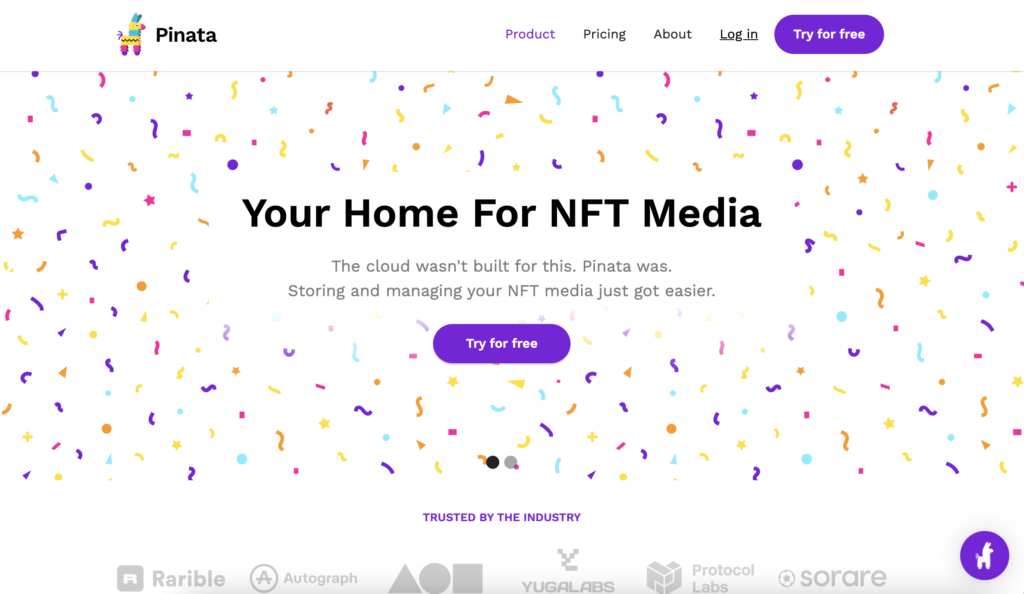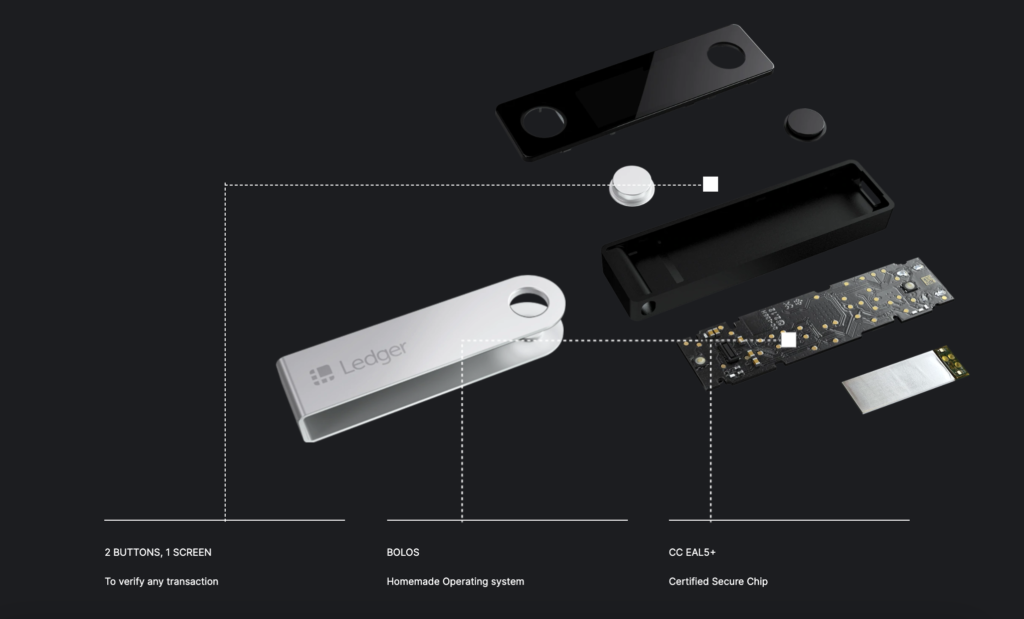The NFT industry has grown exponentially in the past few years.
There are now thousands of NFT projects, with more being added each day. NFT sales volume totaled around $25 billion in 2021 alone.
So, if you have been investing in these booming assets, how do you store them?
This post will cover how to store your NFTs safely and outline some of the different options for storing your NFTs.
Let’s get started.
Why is it important to Safely Store your NFT?
NFTs have recently become extremely valuable assets with some projects being worth several millions of dollars. The NFT boom has attracted a huge pool of investors which has also attracted many hackers wanting to steal tokens, accounts, or payment data.

$2.2 million worth of NFTs were recently stolen in a phishing scam from a prominent art gallery owner. The thieves sold much of the collection, which included four Bored Ape NFTs. The issue with decentralized networks when a hack like this happens is that it is essentially impossible to reverse the transaction or turn to any legal authority for help.
If NFTs are stored in an easy-to-access interface, they will be more vulnerable. Likewise, if you don’t have effective security measures in place for your accounts, like 2FA, then you run an even greater risk. Therefore, how you store your NFTs and the security measures you have in place have a direct impact on their safety.
What Options are Available to Store your NFT?
There are a variety of options available to store your NFTs, including:
- Software wallets
- Hardware wallets
- InterPlanetary File System (IPFS)
For people who only own a few NFTs that aren’t too valuable, then a smartphone app like Coinbase Wallet or MetaMask is probably enough. However, if you are storing high-value pieces, you will need to use a more secure storage option.
Software Crypto Wallets
Software wallets are wallets that are installed on your computer or phone and store your NFTs. They can be used to send, receive, and store NFTs. The main benefit of software wallets is how easy they are to use. They also provide a certain level of convenience as you can access them from anywhere and any device with an internet connection.

However, software wallets have one major drawback: if your computer or phone is hacked then the NFTs stored in that wallet will be vulnerable to theft unless extra security measures are taken.
The best software wallets for NFTs are Coinbase Wallet, Metamask, and Trust Wallet.
Hardware Wallets
Hardware wallets are physical devices that store the private keys for your NFTs and allow you to send, receive, or sign transactions from any device with an internet connection. Hardware wallets provide improved security over software wallets as they can’t be hacked by malware on your computer or phone. Additionally, they are immune to keyloggers as the private key is not entered into the device.

This makes hardware wallets the safest option for storing NFTs.
Hardware wallets come in a variety of shapes and sizes, but all have one thing in common: they provide an offline storage option for your NFTs. This means that if you lose your hardware wallet or it gets damaged then your tokens will still be safe.
The best hardware wallets for NFTs cold storage are Trezor or Ledger.
InterPlanetary File System (IPFS)
IPFS is a decentralized file storage system that uses peer-to-peer protocols to create distributed applications. It allows users to store files in an anonymous, permanent way with no single point of failure or censorship.

IPFS can be used to store NFTs, but most are not as user-friendly as software wallets or hardware wallets. However, it is one of the most secure storage methods available for NFTs and new solutions have hit the market that makes it simpler for anyone to use.
The best IPFS solution for NFTs storage ease-of-use and security is Pinata.cloud.
How do you decide on the ideal NFT storage option?
How to Choose an NFT Wallet?
There are a couple of questions you should ask yourself to help determine how best to store your tokens. These include:
- How many NFTs do you own?
- How valuable is your collection?
- What are your storage needs (e.g how often will they need to be accessed)?
If you only have one or two NFTs of lesser value, then a smartphone app wallet is probably sufficient for your needs. However, if you are storing dozens of different types of NFTs or high-value ones, then it’s best to use a hardware wallet.
How often do you need to access your tokens?
If you need to frequently send and receive NFTs then a software wallet is the best option. If you only need to occasionally sign transactions then a hardware wallet will suffice.

What level of security do you require?
If you are storing high-value NFTs then it’s best to use a hardware wallet. If they only have minimal value, then software wallets like Coinbase Wallet or Metamask will suffice.
You should also properly gauge your technical abilities. The last thing you want is to lose your assets because of faulty maneuvering or forgotten credentials.
Software wallets may be the easiest option for people who aren’t very tech-savvy as they are intuitive and easy to use. However, they are not the most secure storage option.
Hardware wallets or IPFS can be more complicated for non-technical users, but they offer a much higher level of security.
What Is The Best Way To Store Your NFT?
The best and safest option is to store your NFTs on a hardware wallet. This cold storage method keeps your assets safe from online threats by keeping them offline and within your complete control. The most trusted and user-friendly options for a hardware wallet are Trezor or Ledger.

However, the best way to store your NFTs also depends on how valuable they are, how often you need to access them, and your level of technical ability.
If safety is less of an issue and convenience is paramount, then using a software wallet like Coinbase Wallet or MetaMask can be a good option. Again, this does pose safety risks but offers extreme convenience.
IPFS can be a great option for people who want to store their NFTs in a decentralized and anonymous way, but it can be difficult for non-technical users.
Top Tips For Safely Storing Your NFT
- Use a hardware wallet if possible. An offline cold storage method will keep your NFTs safe from online threats and give you total control over how they are accessed.
- If using software wallets, utilize two-factor authentication to add an extra layer of security by requiring additional information before any transactions can be made or accounts accessed.
- Keep your passwords and login information safe and secure, preferably offline.
- Store your NFTs in different wallets to spread the risk if one is compromised.
- Backup your wallets regularly. This includes both software and hardware wallets. If something happens to them you will lose access to your tokens.
- Be vigilant of phishing scams. Never open links or attachments from unverified sources and always double-check the URL before entering any personal information.
- Protect your computer, phone, and browser by downloading anti-virus software to block malware that can steal passwords when you’re online.
Frequently Asked Questions
What is an NFT?
NFTs or non-fungible tokens are cryptographically unique, verifiably scarce digital assets. They have many different forms but can represent everything from real-world objects to virtual collectibles and even cryptocurrencies.

Why do you need to store them?
Storing your NFTs properly is important as they are susceptible to theft and loss. By keeping them in a safe place, you can protect your investment and ensure that they are accessible when you need them.
What is a crypto wallet?
A cryptocurrency wallet is a place where you store your tokens or NFTs. They can be software or hardware wallets that are designed to securely hold onto your tokens and let you access them when needed.
Conclusion: How To Store NFT Assets
There are a variety of different ways that you can store your NFTs, each with its own benefits and drawbacks. The best way to choose how you store your tokens is to carefully assess how often they need to be accessed, how many NFTs are being stored, and the level of security required.
- Software wallets are convenient to use and provide a good level of security but can be hacked if not properly secured.
- Hardware wallets are immune to keyloggers and provide improved security, but can be expensive and difficult to use.
- IPFS is a decentralized and anonymous option but can be more difficult to use for non-technical users.
Which storage method is best for you will depend on a variety of factors, so it’s important to do your research before making a decision. By understanding how each option works you can make an informed decision about how best to store your NFTs.
Happy storing!
